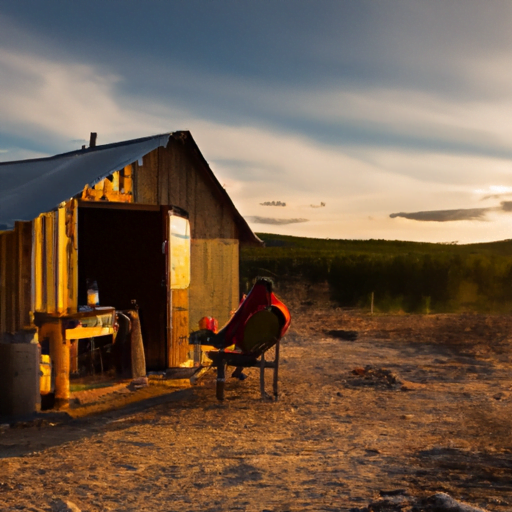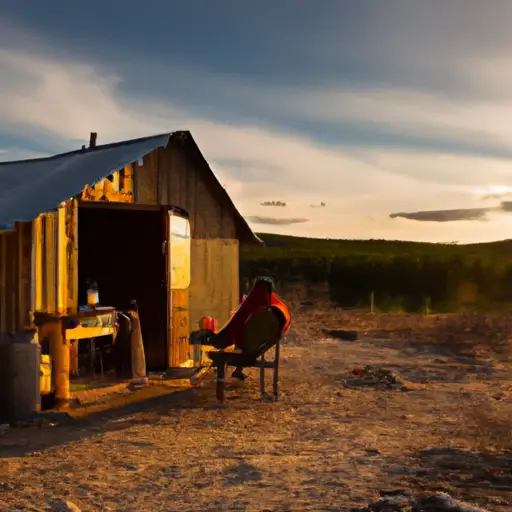Have you ever wondered what it would be like to live completely off the grid? To disconnect from the modern amenities and live a simpler, self-sustained lifestyle? Well, today we’re going to dive into the fascinating world of off grid living and explore just how people are able to do it.
Living off the grid essentially means being self-sufficient and not reliant on public utilities such as electricity or water supply. It involves generating your own power, growing your own food, and finding alternative solutions for everyday needs. In a world where technology keeps advancing, off grid living is seen by many as a way to reconnect with nature and reduce their ecological footprint.
In this article, we’ll take a closer look at the different aspects of off grid living. We’ll explore the various ways people generate electricity, such as solar panels or wind turbines, to power their homes. We’ll also delve into the methods they use to collect and store water, as well as the techniques employed in growing and preserving their own food. So, if you’ve ever been curious about how people are able to live off the grid and be self-sustainable, keep reading because you’re about to learn more!

Introduction to Off-Grid Living
Living off the grid has become an increasingly popular lifestyle choice in recent years. It offers individuals the opportunity to disconnect from the traditional utilities and infrastructure that are so deeply ingrained in our daily lives. Instead, people who embrace off-grid living seek alternative means of generating energy, sourcing water, producing food, and managing waste. This article aims to explore the essential components of off-grid living, the challenges and solutions that come with it, the financial and economic considerations, and the environmental benefits that make it a compelling choice for many.
Essential Components of Off-Grid Lifestyle
Generating Energy
One of the fundamental aspects of off-grid living is finding alternative ways to generate energy. Solar power is a popular choice, harnessing the sun’s energy through solar panels. These panels convert sunlight into electricity, powering homes and other necessities. Wind power is another viable option, utilizing wind turbines to convert wind energy into electricity. Hydro power involves capturing the energy from flowing water, while bioenergy utilizes organic materials such as wood or waste to produce heat or electricity.
Water Sources and Conservation
Having a reliable and sustainable water source is crucial for off-grid living. Rainwater harvesting allows individuals to collect rainwater from rooftops and store it for various uses. Well or borehole water can also be used, although it requires drilling into the ground to access groundwater. Water filtration and purification methods ensure that the water being used is safe and potable. Additionally, employing water conservation techniques reduces water usage and promotes responsible usage.
Food Production and Preservation
Living off the grid often necessitates growing your own food. Vegetable and fruit gardens provide a steady supply of fresh produce, reducing dependence on supermarkets. Livestock and poultry farming offer a source of meat, eggs, and dairy products. To ensure long-term food sustainability, off-gridders turn to canning and fermentation techniques for food preservation. Root cellars and pantries provide storage spaces to keep food fresh for extended periods.
Waste Management
In off-grid living, waste management becomes a matter of utmost importance. Composting is a natural process of decomposing organic waste, turning it into nutrient-rich soil. Greywater recycling allows for the reuse of wastewater from sinks, showers, and washing machines for irrigation purposes. Reducing and reusing items minimizes waste production in the first place. Alternative toilet systems such as composting toilets or incinerating toilets are used as environmentally friendly alternatives to traditional flush toilets.
Generating Energy
Solar Power
Harnessing the power of the sun, solar panels are strategically installed to capture sunlight and convert it into electricity. This clean and renewable energy source allows off-gridders to power their homes and appliances without relying on the electrical grid.
Wind Power
Wind turbines are used to capture the kinetic energy of the wind and convert it into electricity. Off-grid homes situated in windy locations can benefit greatly from this method, generating electricity while minimizing their carbon footprint.
Hydro Power
Hydro power involves utilizing the energy generated from flowing water, such as rivers or streams, to generate electricity. This renewable energy source can be highly efficient and reliable, especially in areas with a steady supply of water.
Bioenergy
Bioenergy involves utilizing organic materials such as wood, agricultural waste, or even animal waste to produce heat or electricity. This method not only provides an alternative energy source but also promotes the utilization of renewable resources effectively.

Water Sources and Conservation
Rainwater Harvesting
Rainwater harvesting involves collecting and storing rainwater for later use. This can be done through the use of rainwater barrels or tanks connected to gutters or downspouts. The collected rainwater can then be used for various purposes, such as gardening, washing, or even drinking after proper filtration.
Well or Borehole Water
Drilling a well or borehole can provide a consistent and reliable source of groundwater. This provides off-gridders with access to clean water for daily needs, reducing their reliance on other water sources.
Water Filtration and Purification
Ensuring the quality and safety of water is crucial in off-grid living. Water filtration and purification systems, such as reverse osmosis or UV sterilization, remove impurities and potential contaminants, making the water suitable for consumption.
Water Conservation Techniques
Off-grid living emphasizes responsible water usage and conservation. Implementing water-saving fixtures, such as low-flow showerheads and faucets, as well as practicing habits like shorter showers and reusing water for multiple purposes, help minimize water consumption.
Food Production and Preservation
Vegetable and Fruit Gardens
Growing vegetables and fruits is a cornerstone of off-grid living. Establishing and maintaining a garden provides a steady supply of fresh and nutritious produce. This reduces reliance on supermarkets and promotes self-sufficiency.
Livestock and Poultry Farming
Raising livestock and poultry offers a source of meat, eggs, and dairy products in an off-grid setting. Setting up a small-scale farm allows individuals to have a sustainable source of animal products that are free from chemicals and antibiotics.
Preserving Food through Canning and Fermentation
To ensure long-term food availability, off-gridders turn to food preservation methods such as canning and fermentation. Canning involves sealing food in jars at high temperatures, effectively extending its shelf life. Fermentation, on the other hand, harnesses the power of good bacteria to preserve food and enhance its flavor.
Root Cellars and Pantries for Storage
Root cellars and pantries provide storage spaces for food preservation. Root cellars are specifically designed to optimize humidity and temperature conditions, allowing vegetables and fruits to stay fresh for extended periods. Pantries serve as storage areas for canned goods, preserved food, and other essential supplies.
Waste Management
Composting
Composting is a natural process that turns organic waste into nutrient-rich soil. Off-gridders use composting systems to dispose of kitchen scraps, garden waste, and other organic material. The resulting compost can then be used to enrich the soil in gardens or for other purposes.
Greywater Recycling
Greywater recycling refers to reusing wastewater from sources such as sinks, showers, and washing machines for non-potable purposes. This reduces water usage and minimizes the strain on water resources.
Reducing and Reusing
Embracing a minimalistic lifestyle and reducing waste production is a key principle in off-grid living. Off-gridders prioritize reusing items whenever possible and actively seek to minimize waste through conscious consumption habits.
Alternative Toilet Systems
Traditional flush toilets are not always practical or sustainable in off-grid settings. Off-gridders often opt for alternative toilet systems such as composting toilets or incinerating toilets. These innovative systems provide environmentally friendly solutions for waste management.
Challenges and Solutions in Off-Grid Living
Limited Access to Resources
Living off the grid often means being in remote areas, which can pose challenges in terms of access to resources. Solutions include careful planning and resource management, as well as utilizing alternative sources such as renewable energy and local water sources.
Maintaining and Repairing Off-Grid Infrastructure
Off-grid lifestyle requires individuals to take on the responsibility of maintaining and repairing their own infrastructure. This includes maintaining energy systems, water sources, and waste management systems. Regular maintenance and learning basic repair skills are essential to ensure the smooth functioning of off-grid infrastructure.
Dealing with Extreme Weather Conditions
Extreme weather conditions, such as heavy rainfall or strong winds, can pose challenges to off-grid living. Adequate preparations, such as proper waterproofing and reinforcing structures, are necessary to withstand these conditions. Furthermore, having backup systems or alternative energy sources can help mitigate any disruptions caused by harsh weather.
Educating and Integrating with the Local Community
Living off the grid often means becoming part of a broader community. Educating oneself about local regulations, customs, and practices is essential for successful integration. Building positive relationships and contributing to the local community can create a support network and foster a sense of belonging.
Financial and Economic Considerations
Initial Setup Costs
Transitioning to an off-grid lifestyle can involve significant upfront costs. This includes the purchase and installation of renewable energy systems, water sources, and waste management solutions. However, in the long run, these initial investments can result in substantial cost savings by reducing or eliminating utility bills.
Return on Investment
Although the initial setup costs can be high, off-grid living allows individuals to generate their own energy and produce their own food, reducing their reliance on external resources. Over time, the savings from lower or eliminated bills can result in a substantial return on investment.
Income Generation Opportunities
Off-grid living often promotes self-sufficiency and entrepreneurial spirit. Individuals can develop income-generating opportunities by selling surplus produce, homemade goods, or services that cater to other off-gridders or the local community.
Bartering and Local Economy
Off-grid living encourages self-reliance and community connections. Bartering, or the exchange of goods and services without the use of money, can foster a strong local economy and provide opportunities for individuals to obtain what they need without relying on traditional currency.
Environmental Benefits of Off-Grid Lifestyle
Reduced Carbon Footprint
By relying on renewable energy sources instead of fossil fuels, off-grid living significantly reduces an individual’s carbon footprint. Solar, wind, hydro, and bioenergy options emit little to no greenhouse gases, making them environmentally friendly alternatives.
Conservation of Natural Resources
Off-grid living promotes responsible resource consumption. By conserving water, minimizing waste, and utilizing sustainable farming practices, off-gridders contribute to the conservation of natural resources such as water, land, and forests.
Protection of Biodiversity
Off-grid living often involves living in harmony with nature. By preserving and protecting natural habitats, off-gridders actively contribute to the preservation of biodiversity. This can include creating wildlife-friendly gardens or utilizing farming practices that prioritize ecological balance.
Sustainable Land Use Practices
Off-grid living encourages sustainable land use practices, such as permaculture or regenerative agriculture. These practices focus on building healthy and resilient ecosystems, improving soil health, and promoting biodiversity, all while providing sustainable food sources.
Conclusion
The off-grid lifestyle offers individuals the freedom to disconnect from traditional utilities and embrace a simpler and more sustainable way of living. Exploring alternative methods of generating energy, sourcing water, producing food, and managing waste empowers individuals to become more self-reliant and resilient. While off-grid living comes with its challenges, such as limited resources and maintaining infrastructure, the financial, economic, and environmental benefits make it an attractive choice for many. By reducing their carbon footprint and protecting natural resources, off-gridders are paving the way towards a more sustainable future. So, if you are seeking a lifestyle that prioritizes self-sufficiency, resilience, and a deeper connection with nature, then exploring off-grid living may be the path for you.




